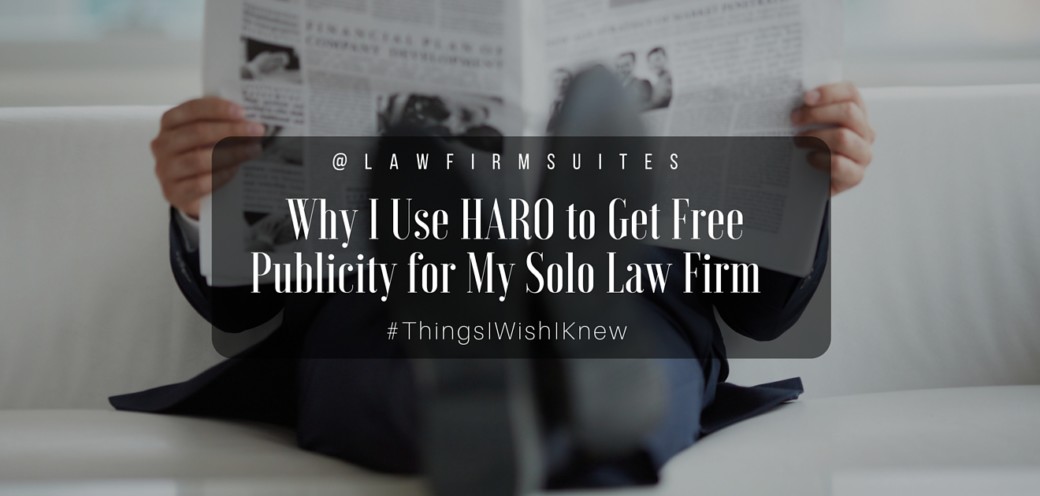In this week’s edition of Things I Wish I Knew, Joleena Louis explains how she uses a website called HARO to promote her firm and build her personal brand.
Solo lawyers have very little time for marketing and public relations. Between client work and administrative tasks, it can feel overwhelming to promote a law firm on your own. This makes it especially important engage in tactics that require only a small time commitment and produce big results.
I always talk about the importance of an online presence because now, more than ever, people are conducting online searches to research legal services before picking up the phone. You need to make sure your law firm is appearing on the first page of search results or you’ll be losing out on new business.
One of the tools I’ve used to get my law firm to show up in search results is HARO, which is an acronym for Help A Reporter Out. It’s a site that connects journalists with sources and it’s free to use. You can get great results if you are willing to put in a little work.
Getting an SEO Boost
Being quoted in a news article is valuable for two reasons: it gets your name out there and it is great from your website’s SEO.
When a journalist mentions you in their article, they will link back to your law firm’s website. If you’re being quoted in a popular publication with a lot of site authority, such as the New York Times or Huffington Post, then you’ve earned a quality backlink, giving your website a huge SEO boost.
Establishing Your Expertise
As a licensed attorney, you are considered an authority on legal matters. You’ve studied the law and you work on legal issues every day, which makes you a valuable source for a reporter. Getting quoted in an article is an easy way for you to leverage your position as a legal expert, which will enhance your personal brand and increase the visibility of your firm.
Additionally, if you’re doing your marketing right, then it’s likely you have a practice niche and you spend a significant amount of time establishing your expertise in that niche. For example, if you are a divorce attorney with a practice niche in custody battles for fathers who want equal parenting time, you would use your marketing strategy to support your position as an expert in these cases. You would write blog articles, engage on social media, speak at events and get quoted in publications. That way, when a prospective client searches for an attorney with your niche, you have the materials to support your claim that you are the most qualified attorney to handle their matter.
Being mentioned in a notable publication because of your knowledge in a specific practice area is the ultimate way to support your credibility. It could also open the door for even more opportunities to demonstrate your knowledge in that field.
Achieving Long-term Benefits
Since I started using HARO in 2014, I’ve been quoted in several notable publications such as US News & World Report, Wise Bread, and Women’s Day.
These mentions have resulted in:
- Making me look more impressive to clients who Google my name.
- Quality links to my website, improving its ranking.
- Valuable relationships with journalists.
- Other media and promotional opportunities.
- Great material to promote on social media.
I’m not the only lawyer who has experienced the long-term benefits of HARO. Bob King, the founder of Legally Nanny, discusses how HARO helped him promote his small law firm.
“As a lawyer at Legally Nanny, I’m one of literally hundreds of thousands of attorneys people can choose from. By using HARO, I stand out from the crowd.
Letting others know my specialty – representing people who employ people in their home – can be challenging and costly. As a small businessman, I can’t afford expensive mass advertising, nor would it be effective for the niche market I serve.
I rely exclusively on targeted media and PR to get the word out about our firm.
Thanks to HARO, I was quoted in The Wall Street Journal. For a small law firm like ours, that is a major coup.
That story led to numerous new clients, as well as more interview requests from other publications. I even established a working relationship with that reporter, and she’s used me as a source for other stories.
I also let trade publications in my industry know about the article, and they re-published it, continuing the cycle of free publicity. Now when people search for Legally Nanny or my name, they come up with our website or (even better!) one of the articles that mentions our firm. All this came from answering one email.
This costs nothing but a bit of my time. HARO is a win-win for everyone involved.”
How HARO Works
Once you sign up for HARO, you will receive three daily email newsletters with a list of reporters requesting information. When you find a relevant request, you reply to the reporter via a link.
Keep in mind that there are usually instructions on how they want you to reply and your response may be ignored if you don’t follow the instructions.
Many reporters get hundreds of responses, which may reduce your chances of getting selected. In my experience, it’s a numbers game. If I respond to five or more, I usually get a request for additional information from one reporter. Responding to each request takes about ten minutes, which means you only have to spend about an hour each week on HARO to achieve results.
HARO is a great tool to use as part of your marketing arsenal. Taking a few minutes a day to scan the newsletter and respond to relevant requests is a small investment that could pay off big time.


